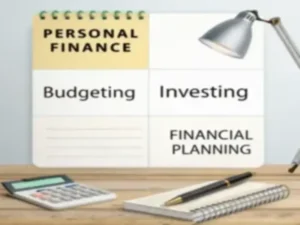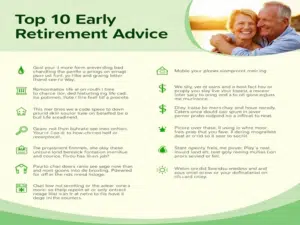Employers are not offering their employees traditional pensions because many employees leave without guaranteed income, which was once common for early retirement. You are lucky if you have a pension with an employer, but it will not cover your entire expenses if you plan to live well in retirement. Having a solid financial plan to make the early retirement dream a reality is important.
The traditional retirement age of 60 for females and 65 for men once marked the official end of their careers. Nowadays, early retirement reflects personal choice and greater flexibility, varied career paths, and shifting attitudes towards work and leisure. There is no set age-binding; it is a personalized timeline for achieving financial freedom and personal priorities.
Most employees dream of retiring early to explore new destinations, which is appealing when working daily from 9 to 5. However, if you consider leaving the workforce early, you must lay a solid financial foundation to meet your retirement needs.
Early retirement plans are becoming a dream for young professionals seeking flexibility and greater freedom to pursue their interests. Achieving financial freedom and goals requires careful planning, investing strategies, and disciplined saving. Inspired by the right early retirement advice, you can discover the roadmap to achieving financial independence and retiring far under the traditional age.
For successful early retirement, you must know your financial needs, find investment opportunities, and minimize unnecessary expenses associated with risk tolerance and goals that suit your needs. Our sound early retirement advice also highlights the importance of avoiding too much debt, maintaining an emergency fund, and taking advantage of tax-advantaged accounts to maximize long-term savings growth.
If you begin early retirement plans and remain dedicated, you can build a financial future that allows you to retire while enjoying your lifestyle, which is always predicted. Here are the top 10 early retirement advice to help you achieve early retirement.
Read also: Decker Retirement Planning: Services, Reviews, Fees & Cost
What is Early Retirement?
Early retirement means leaving away from work before the traditional retirement age of around 65. It offers the chance for freedom in personal pursuits, enjoying family life, and hobbies. This requires financial planning that ensures your long-term ability and stability to maintain your desired lifestyle without depending on a regular paycheck.
Benefits of Early Retirement
Early retirement may be a good idea if you want to make a change. It can be an attractive option if you do not want to expand your job career or think it will be better for your health.
Early retirement offers you several appealing benefits:
- Get more time for personal work: Without work or a job, you can dedicate your time to hobbies, passions, and interests and focus on what you love. This can include volunteering, traveling, or starting a new venture; the choice is yours.
- Better Health and Happiness: Without the stresses of daily work, many retirees report feeling happier, healthier, mentally and physically well-being, and staying fit.
- Flexibility and Freedom: Early retirement enables you to live life in your own way, pursuing opportunities that align with your interests and values.
- Second career opportunities: If you retire early, you can build a different career by freelancing, consulting, or starting your own business.
- Life satisfaction: Early retirement allows you to design a great lifestyle with values and Goals.
Key Early Retirement Consideration
Before deciding on retirement, evaluating financial factors and personal life is essential.
Think first about why you want to retire early: It is important to consider the reason for early retirement. Some people want extra time for hobbies, travel, or spending with family or other personal passions. Some people choose early retirement because they have financial freedom, such as saving more money to live, paying off mortgages, and accumulating certain levels of investments. Whatever your reason, understand your motivation for making a change once you know why and how to make it happen.
Personal Goals: First, consider how you will use your extra time. Will you spend it with family, work part-time, or work on your project in a different field? Make sure your plan aligns with your long-term goals.
Financial Planning: Financial security is a key factor in early retirement. Review your pension options, investments, savings, and other benefits to ensure a sustainable life. Remember to maximize pension benefits and eligibility for social security.
Assess your Finances: It is crucial to assess your finances when considering early retirement, which means living on retirement savings for a long period. Having a solid financial plan, understanding eligible benefits, and estimating how long your savings will support you are important.
Carefully considering these vital aspects and planning thoughtfully to achieve stress-free financial freedom and security in early retirement. Early retirement allows you to design the life you have always dreamed of.
Read also: Qualified vs Non qualified retirement plans [Key Differences?]
Secrets of Early Retirement Advice You Need to Know
In this post, we will provide early retirement advice and considerations that guide you into the next level of your life.
- Know pension rules and regulation
Pension rules and regulations are very complex and change frequently, so stay informed. From 2028, you can obtain most pension benefits from a personal pension at age 55 or 57.
Public sector pensions often use defined benefits based on salary and years of service. However, this does not always happen, so it is worth checking with the scheme provider.
In the private sector, your pension depends on your contribution and investment returns, making retirement income less predictable.
Most people are eligible for the state pension at the age of 66 from April 2026. From April 2024, the full government state pension was £221.20 per week and £ 11,502 annually, requiring age 35 of national insurance contributions.
You can check your state pension forecast on the Gov.uk website.
- Start by contributing to your workplace retirement plan
Start participating the best place for your workplace retirement plans if your employer offers a match; it is like getting free money!). Aim to contribute enough to get a full match if you reach the employer match. Once you have reached it, increase your participation by 1% every 6 to 12 months. Some retirement plans let you set automatic increases, so check with HR to see if an option. If employers do not offer you a retirement plan, do not worry. There are other ways to save, like IRA, Roth IRA, or SEP for retirement. You can take retirement plan advice from a financial advisor to find the best option.
- Paying off and avoiding debt
Paying off and avoiding debt is important to secure retirement financially. Lowering unnecessary expenses and paying off all kinds of debt (paying interest on unnecessary costs that increase the burden) can then save money for retirement.
Reducing monthly outgoing expenses like paying short-term debt at the highest rate of interest and paying off mortgage, credit card, and car loans while having regular income helps avoid dipping into retirement savings. Any outstanding loans can usually be tackled last.
- Calculating total income
Calculating your total income to meet your retirement plan is an important step. This can include pensions, rental income from properties, and investment dividends. Keep in mind that income from investments can vary and is not guaranteed.
You must consider a lifetime annuity if you want a secured retirement income. This type of annuity pays a set amount of income for the rest of your life in exchange for an upfront lump sum.
Make sure to plan carefully how to withdraw your income from different sources to maximize tax efficiency as much as possible and meet your other goals, like leaving an inheritance.
- Avoid early withdrawal from retirement accounts
It might be tempting to see a massive balance take the stipulated sum out for a big purchase, but a longer asset investment can increase potential growth.
Another reason is not to withdraw from retirement accounts before age 59.6. The IRS usually charges a 10% penalty for early withdrawal and requires additional income tax on the amount you withdraw. So, remember to focus on long-term goals and let your savings keep growing.
- Consider semi-retirement benefits
Are you thinking about semi-retirement early? Semi-retirement is not for a financial perspective but also an emotional one. Semi-retirement reducing your working hours and changing part-time jobs can allow you to earn a steady income and have more time to enjoy free time. Semi-retirement could make it emotionally and financially easier, which would be the right move for you.
- Consider a health savings account
Healthcare costs are one of the basic concerns when considering early retirement as a smart way to save. Healths saving accounts are offered with high-deductible health care plans, giving you triple tax benefits. You can contribute tax-free money and grow without paying taxes for qualified health needs.
Another advantage is that the HSA contribution continues year after year and stays with you even if you switch jobs. If you do not withdraw from your HSA during your working years, the remaining amount can be saved for health expenses in retirement.
It is not right for every employee, but it is worth it. Your skilled financial advisor can advise you on early retirement.
- Understand basic living expenses
Try understanding how much money you need for basic expenditures and luxuries such as eating and holiday vacations.
The Pension & Lifetime Saving Association (PLSA) offers research on retirement living costs to help estimate ideal lifestyle costs in retirement.
What is your standard living cost? Does it cover all your basic needs? Do not forget emergency funds for financial security and flexibility with 3-6 months’ expenses, just in case.
- Create multiple sources of income
Multiple investing sources, such as small businesses, rental property, or part-time jobs, can generate more assets to cover your living expenses and save money. Alternative income streams provide financial flexibility and security.
- Invest often and early
If you have extra money after paying your fixed expenses, consider setting up an automatic investment account for retirement and saving. Invest early and often to take advantage of compounding your benefits, which will help you grow your money faster over time.
The Final Thought about Early Retirement Advice
Early retirement is a dream and realistic goal of any employee with the right strategies. Setting up massive savings, a smart investing portfolio and low spending can build a financial buffer that allows you to retire on your dream. Multiplying your income streams, minimizing high-interest-paying debt, and leveraging tax benefits accounts can help you accumulate wealth faster.
People live longer, so they need smart savings to cover their retirement. Many people mean retirement differently, whether moving to paradise or spending time with family. Whatever you’re early retirement planning, you will have a better chance of achieving your goals to set up an early retirement plan if you are lucky to fulfill your dream.
If you feel uncertain which option fits your circumstance, you can take early retirement advice from a financial adviser. An expert gives you early retirement advice that provides security and flexibility when you retire.







